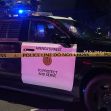Three black defendants, two brothers and their cousin, were convicted of murdering two persons of the same race in a gang-related confrontation about allegedly stolen guns in 2012. Now, they will get a new trial because one of their potential jurors was improperly excluded from service after expressing support for the Black Lives Matter (BLM) movement.
During jury selection, defendants argued that the prosecution’s use of a peremptory challenge for the BLM supporter, referred to as “Juror 275,” was racially discriminatory. Prosecutors countered that the juror, a 25-year old Black female postal worker, was hostile and had “anti-prosecution issues.” The appellate court found that the defendants’ challenge was improperly denied, and the case was remanded for a new trial.
Writing for a three-judge panel of the First Appellate Division of the California Court of Appeal, Presiding Justice James M. Humes issued a 70-page opinion with concurrences by two other associate justices. Humes provided the facts about the shooting of Christopher Zinn and his girlfriend Brieanna Dow.
Trial evidence showed that two of the defendants, brothers Sheldon Silas and Reginald Whitley, confronted the victims about the guns. The couple ran away but were pursued by the defendants and their cousin Lamar Michaels, who drove a separate car. During the trial, prosecutors argued that Silas was the killer, aided and abetted by Whitley and Michaels.
A fourth defendant, Linda Chaney, was charged in the same case for various counts related to attempted witness dissuasion and other offenses. Her conviction was also reversed.
The appellate court’s decision was based on the improper denial of the defendants’ Batson/Wheeler motion, which is an objection that seeks to bar a peremptory challenge because it has racial bias. Defendants argue that Juror 275 received a peremptory challenge when she stated support for BLM. They said this exclusion violated the right to trial by a jury drawn from a representative cross-section of the community as guaranteed by the California Constitution and the U.S. Constitution’s Fourteenth Amendment guarantee of Equal Protection. While the basis in this case was race, Batson/Wheeler motions can also be made in cases involving gender, ethnicity or sexual orientation.
There are three steps to a Batson/Wheeler challenge: A challenged juror must come from a protected group; the opposition must have used a peremptory strike against that prospective juror; and the facts and circumstances must create an inference of “purposeful discrimination” that demonstrates the prospective juror was struck because of membership in the protected group.
The trial began in October 2015 but was ruled a mistrial due to the death of one of the attorneys. The retrial, which resulted in the remand, began in August 2016 when the three male defendants were charged with murder, conspiracy to commit murder, firearms violations, and gang-murder special circumstances enhancements.
The jury selection under examination here showed that the prosecutor exercised peremptory challenges against three Black prospective jurors. The defense raised Batson/Wheeler motions for each of them. The trial judge found no discrimination regarding the first two jurors. But Juror 275 was found to meet Batson/Wheeler criteria. Rather than denying the motion, however, the court accepted the prosecutor’s now-discredited reason for the challenge.
The final jury, which had two Black members, convicted the three male defendants. Silas was sentenced to life without parole plus 70 years to life plus seven years. Whitley received life without parole plus 50 years to life plus seven years. Michaels also received life without parole plus 67 years to life plus eight years and eight months. Ms. Chaney received a total of 11 years.
When reviewing Batson/Wheeler challenges, Justice Humes wrote, the court must examine “all of the circumstances that bear on the issue of racial animosity…” He provided a careful review of the facts that included examples of questionable prosecutorial behavior that included Batson/Wheeler violations.
Humes then turned to the interaction between Juror 275 and the prosecutor. Juror 275 answered a question about her affiliation with any “law or justice-focused special interest groups” by saying “I support Black Lives Matter,” but clarified that she was not an official member of the group. She said that although she did have strong feelings about the justice system’s treatment of different races, she said “this would not affect her as a juror.”
During questioning, she said she would be able to objectively evaluate testimony by all witnesses, including police officers. She acknowledged that she felt “Black people are being sentenced longer than other races,” but said that her views on sentencing “would not affect her ability to be fair.” She also said she did not agree with people who destroy the property of others. Defense attorneys expressed objections to the perceived “assaultive, aggressive and accusatory type of questioning.”
The prosecutors exercised a peremptory challenge, and the defendants brought a Batson/Wheeler motion. The trial court did not find that a prima facie discrimination case was made and denied the motion. When the prosecutor was asked if she would like to add anything to the record, she said, “I think this is going to be a clear and prime example to our appellate courts of Batson/Wheeler completely out of control. On this jury, ready to be sworn, n who are sitting in the jury. This is a clear example of how defense attorneys exploit what truly is a needed opportunity and . . . make a joke out of jury selection.”
Humes’s opinion then reviewed the questioning of other jurors to see if bias was present. He discussed the propriety of questions about crime in their neighborhoods, whether it has changed over the years, and their perceptions of violence, For example, the prosecutor asked Juror 211 to describe the community where she lived. The juror said, “I would describe Richmond, CA as a community of hope, pride and love.” At a later hearing, the prosecutor quoted the juror’s positive description of her home community and concluded, “No matter what these attorneys want to say, the unfortunate truth is Richmond is …not a community of hope. It’s a community of murder.”
The opinion then turned to the necessary steps in a Batson/Wheeler analysis. The first step is the determination of whether there was a discriminatory purpose. Humes concluded the trial court’s decision was unreasonable in light of the record of voir dire proceedings.”
The second Batson/Wheeler requirement mandates “facially neutral” reasons for the challenges. The appellate court concluded that the prosecutors questioning of Juror 275 about BLM was “not neutral and suggested antipathy toward the movement.” In addition, there were inaccuracies, as well as “unsupported” and “baseless” reasons for exclusion.
In addition, the opinion did not accept the contention that since there were two Blacks on the jury, there could not have been discrimination. “This ignores the fact that other members of the group may have been excluded for improper, racially motivated reasons…(two) Black members provide(s) no assurance that the prosecutor did not act with discriminatory intent by challenging Juror 275.
Finally, the opinion addressed the issue of credibility. Humes reviewed all of the prosecutor’s purported reasons for exclusion. The reasons, he wrote, “do not stand up to scrutiny.” He concluded, “…we are compelled to conclude that “defendants were denied their right to a fair trial in violation of the equal protection clause of the federal Constitution and their right to a trial by a jury drawn from a representative cross-section of the community under the state Constitution.”






